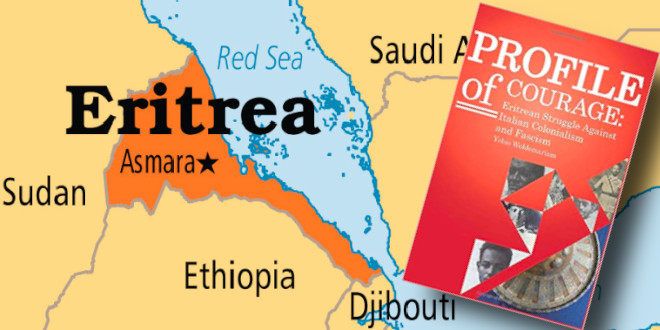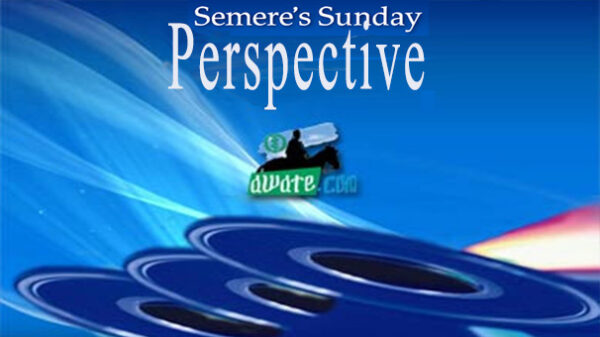Speak Or Hold Your Peace Forever

If you didn’t speak then, please forever hold your peace.
A priest officiating a wedding asks those gathered if there is any just cause why the marrying couple may not be joined together; and exhorts them to speak or forever hold their peace. If no one speaks, the priest then declares the couple husband and wife. Marriage in Christianity is a holy sacrament while in Islam it is a legal contract. “So they are no longer two, but one flesh. Therefore what God has joined together, let no one separate.” (Matthew 19:16) Any of the attendees who have “a just cause” but fails to speak up at the most appropriate time immediately forfeits his/her right to subsequently speak and has to forever hold his/her peace. There is no grace period or statute of limitations. It is a onetime right: use it or lose it.
In 1993, the then Provisional Government of Eritrea announced the names of Eritrean martyrs who died during the 30 years liberation struggle. The long list of 65,000 martyrs rightfully included all those who paid the ultimate sacrifice in both the EPLF and ELF, but also in other smaller splinter groups. There were, of course, the missing names of those who were allegedly liquidated by the EPLF. Some of these liquidated Tegadelti are known by their group names as Menkae and Yemin. The families of these victims were never officially told about the death of their loved ones; and most of their parents have sadly died without known why their children were killed or why they never returned home.
As cruel and unjust as the decision to not inform their families was; the silence of their former comrades who were in a position to speak up was even worse. Most of the high-ranking Eritrean government officials were once classmates, schoolmates and childhood friends to the victims and knew their immediate and extended families. In fact, some of these high-ranking government officials joined the EPLF due to the efforts of these famous victims. Most of the war-hardened and long-experienced EPLF veterans knew about the liquidation of their former comrades; and based on anecdotal evidence, one could reasonably infer most of them were not happy their families were not given the closure they deserve and desperately needed; but none of them spoke up. They squandered a perfect opportunity to do what was right, fair and just.
Talking about fairness, one could argue that the case of the Menkae, unlike that of Yemin, was officially addressed in the 1977 EPLF’s organizational congress, and, perhaps, people in their collective wisdom might have decided there was no need to reopen old wounds. When national reconstruction and state building were the pressing priorities of the newly independent nation, any kind of readdress of historical injustices could potentially be destructive—leading to unnecessary distractions and inevitably derailing the whole process of national development. The fear of negative ramifications seemed real; but telling their families about their death has nothing to do with readdressing historical injustices. Whether these tegadelti were on the right or wrong side of history, they were there to serve the cause of the liberation. Regardless of what precipitated their killing, their families have the right to know.
Governments and liberation organizations can impose the death penalty on those found guilty on treason, sedition and subversive activities and the EPLF is no exception. Of course, a due process of law leading to a guilty verdict has to pass the “beyond reasonable doubt” legal doctrine. This is the fundamental legal assumption and a basic tenet of justice. The killing of Menkae, Yemin and others are shrouded in secrecy and no due process of law seemed to have been followed. No wonder, many of the top EPLF leaders shamelessly and irresponsibly feign ignorance on the subject. But, ignorance does not exonerate anyone from due punishment. A willful negligence of responsibility is equally bad.
My goal in this article is not to revisit a subject that has become an unhealthy obsession for some people, but to point out how this obsession is derailing our struggle for justice and regime change. Those who were old and knowledgeable enough in 1993 and did not speak up against the injustices which befell the families of the alleged EPLF’s victims, have forfeited their right to speak on the subject and they should forever hold their peace or, at least, till a time when we can set up independent inquiry commissions. In plain and simple language, I say these people have lost the moral authority to speak on behalf of Menkae, Yemin and others. They are not enhancing our moral awareness through their crocodile tears. But, far worse, they are sowing the seeds of division where unity should be our only concern. However, misused and abused, there is a place for the “hade hzbi: hade libi” mantra in our national life and struggle. We cannot realize the dream of an independent, free, just, peaceful and prosperous Eritrea without a concerted effort. We need to set our priorities right and focus on what brings us together and not on what separates and divides us.
Beneath the veneer of their shallow moral outrage, one can easily see they are foolishly motivated by some antiquated and atavistic sentiments. But the Eritrea of yesterday is not the Eritrea of today and one cannot lead a movement by remaining stuck on the first rung of the evolutionary ladder. Sewra Ertra is by far the most important collective experience we have proudly undertaken as people and it is the most important foundation of our national being. Like all human experiences, it has some dark spots in its otherwise glorious history of heroism, sacrifice and love of country; but these wrong detours should only serve as a cautionary tales for better understanding; and not to undermine and destroy the very foundation where we are building our house—Eritrea. Sewra Ertra is the rock Eritrea’s house is built on. “The rain came down, the streams rose, and the winds blew and beat against that house; yet it did not fall, because it has its foundation on the rock.” (Matthew 7:25)
Most Eritreans care about correcting the wrongs our Sewra has committed in its 30 years of existence. This interest is not due to some primordial instincts of vengeance; but, because it is a great tribute to our love of justice and fairness and it speaks beautifully about who we are as a nation and people. By remedying past injustices, we are assuring a just future for ourselves and our descendants. By unraveling the past in the present, we get a better perspective to create a better future. This is where we need to responsibly exercise our right of intellectual freedom and expression to dissect, analyze and understand our history without lowering the established standards of scholarship and academia. Some fools are, however, in the name of intellectual freedom, rushing in where angels fear to tread. They have no sense of honor, loyalty and service to people and country. But, the last thing we need to do is promote one value at the expense of the other; the need for a right balance of rights and responsibilities is of paramount importance, particularly at this juncture of our national development. We don’t have well-established institutions that can temper our excesses. We should be careful not to throw the baby out with the bathwater. We can have order without freedom but we cannot have freedom without order.
Talking about the Menkae and Yemin and so forth at this point is a disservice to our national cause and a road that is to nowhere. The victims deserve a better platform that we cannot afford to provide them at this point in time. To deal with them now is to politicize them; and to politicize them is to deny them the justice they desperately need and deserve.
The issues of Menkae and Yemin don’t belong to politics. They are the primary concerns of justice and as such they deserve to be handled by independent inquiry commissions. The last thing we need is a few individuals who are poorly armed with the basic tools of recording and researching history to act as both judge and jury and spew their divisive verdicts and willful ignorance. Telling lies with some sprinkles of truth does nobody good.
As people demanding justice, dignity and rights, we need to hold ourselves to higher standards of ethics and morality. Leading by example is the best way to win the hearts and minds of people. Our goal, as the Quran says is to substitute less with better (Surah 16:101) and we can start being better now.



Awate Forum